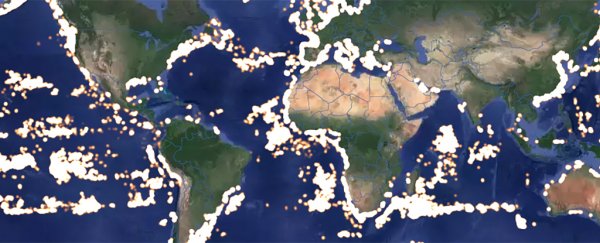With around 71 percent of the Earth's surface covered in water, trying to police what happens out on the oceans is no easy task. But that's where a new Google-powered satellite surveillance system called Global Fishing Watch (GFW) can help.
Designed to act as an always-watching eye in the sky, the system can spot illegal fishing activities from space - with the help of some hardware down on the ground - and you can even explore the GFW map online.
Unlawful fishing is a serious problem, and it affects not just marine life, but the planet as a whole, and all of us who live on it. The WWF estimates that more than 85 percent of the world's fisheries have been "pushed to or beyond their biological limits".
It's hoped the new system will be able to help countries to work together in policing the seas more effectively.
"It will really change the way we manage fisheries because we can see what's happening instead of just trying to envision what's out there on the water," said US Science Envoy for the Ocean, Jane Lubchenco, from Oregon State University.
"We will know, and therefore, we can make smarter decisions."
Alongside Google, conservation and activism groups Oceana and SkyTruth have contributed to the GFW project. It has the capability to track more than 35,000 commercial fishing boats across the oceans, and the system is adding 22 million data points each day.
All of that data requires some serious number-crunching, which is where the cloud computing and machine learning expertise of Google comes in.
Advanced algorithms are used to match up the inputs captured in real-time and convert it into maps: the data stretches back to 2012, and has a three-day lag.
The backers of GFW want governments, journalists, and citizens alike to have access to the data through any web browser, using it to identify potential problems and wrongdoing - zoom in far enough and you can actually identify individual vessels.
Part of the system uses public data from the Automatic Identification System (AIS), which combines information pulled from receivers on land and in orbit to track the movements of ships.
Vessels can disable this tracking technology if they wish, but that itself attracts suspicion, and leads to problems when a ship wants to dock at port or refuel.
The Global Fishing Watch initiative has been in development for two years, and has already been used to highlight illegal tuna fishing off the coast of the Pacific Islands, reports Brady Dennis for The Washington Post.
"A third of the world's fisheries are overfished, and the ones that aren't overfished are at max, with more and more demand," US Secretary of State John Kerry told him.
"Half the world's population, basically, relies on protein from the ocean to survive. It's an ecosystem that requires sustainability to survive, and we're not treating it in a sustainable fashion."
Let's hope Global Fishing Watch can change that. As the National Geographic Society's Enric Sala says: "This is the beginning of the end of illegal fishing,"
